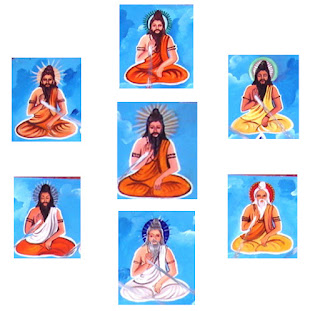Origin of Yoga by Adiyogi
Lord Shiva
according to the Yogic tradition is considered as the ‘Yogeshvara” (Lord of
Yoga). He is considered as the first Yogi of the universe and is also known as
the “Adiyogi” (the first Yogi). Lord Shiva first of all transmitted the
knowledge of Yoga to his consort Goddess Parvati
Human race receives the knowledge of Yoga
Adiyogi looked at the seven sages; known
in the Vedic tradition as the Saptarishis on the day of Dakshinayana (summer
solstice); who were strongly determined to acquire the knowledge of Yoga from
him. The time period is estimated about 15,000 years ago.
On the next full moon day, Adiyogi on
the banks of the lake Kanti Sarovar located near Kedarnath in the Himalayas turned
southwards and started teaching the Saptarishis about Yoga. The day is
celebrated as Guru Purnima in the Indian culture, as the world received its
first Guru (teacher).
Propagation
of Yoga by the Saptarishis
Saptarishis became enlightened after
receiving the knowledge of Yoga and became the limbs of Adiyogi. Then
Saptarishis set out in the seven different directions in the seven different
parts of the world to spread the knowledge of the Yogic science around the
globe. They went to different parts of the world, including Middle East, North
Africa and South America.
The
time period is estimated approximately of 15,000 years.
Reference of Yoga in Vedic era and post Vedic era
literature
According to the Hindu tradition, Vedas
are considered as the supreme truth, the voice of the supreme eternal soul Parabrahman. Around 3 Millennium BCE; Maharishi
Ved Vyas complied the complete knowledge of Vedas in the written form. Before
that, the knowledge of Vedas was passed from one generation to the other
orally. They are regarded as the oldest literature in the world. The first ever
written reference of Yoga was found in the Vedas. Yoga was also discussed in Vedanta literature
in detail in various texts like Upanishads.
In the sermon of Shrimad Bhagvad Geeta, delivered by Lord Krishna in the great
battle of Mahabharata which was fought around 3rd century BCE, the main emphasis was laid on Gyan
Yoga (philosophy), Bhakti Yoga (path of devotional bliss), Karma
Yoga (path of blissful action) and Raja Yoga (path of mind control).
The
first archaeological evidence of Yoga:
Indus Valley civilization is considered
as one of the earliest planned human civilizations. During the excavations, a
seal was unearthed which depicted a person sitting in a Yogic posture
surrounded by animals. The seal is
believed to be representing Lord Shiva in his Pashupati (Lord of Animals) form.
Various such seals and fossil remains were discovered
from the Indus valley excavations with Yogic motives and figures performing
Yoga Sadhana.
The time period of the
Indus Valley Civilization is estimated from 5000 BCE to 1500 BCE. The
geographical area covered by the Indus valley civilization includes the present
day vast region of Pakistan and North Western regions of India which includes
Gujarat, Rajasthan and Haryana. Thus it can be considered as the first
archaeological proof of the existence of Yoga in ancient India.
Yoga in the later period of ancient era:
 |
| Buddha depicted doing meditation in Padmasana pose (Image courtesy: |
During this time period, Maharshi
Patanjali of Vedic tradition composed the famous Yoga Sutras around 400 CE by
compiling the different works on Yoga composed earlier. The text is known as Patanjalayogashastra which is regarded as one
of the authentic source of Yoga.
Yoga
in modern era:
Yoga practices got almost restricted to
certain people during medieval era. But after the advent of modern era in the
20th century, Yoga evolved again due to the dedication of various
Yoga Gurus of India like T. Krishnamacharya, Swami Paramahansa Yogananda, Swami Kuvalayananda, Swami Sivananda Saraswati, Swami Satyananda Saraswati, Swami Chidananda Saraswati, Sri Krishna Pattabhi, B.K.S Iyengar and
Maharishi Mahesh Yogi that Yoga became popular not only in India but in the
western world also.
The scientific aspects of Yoga are also
studied through various research experiments. Thus, Yoga has now developed as a
scientific discipline along with spiritual tradition. Today, Yoga is practised
not only in Indi abut all over the world. The pioneers of Yoga in the present
day include Baba Ramdev & Sri Sri Ravishankar of the Art of Living in India
and various other worldwide.


No comments:
Post a Comment